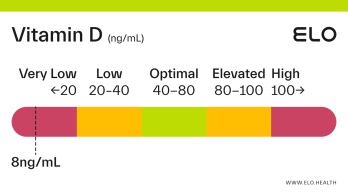Vitamin D: 8 ng/mL

What does a vitamin D level of 8 mean? Are there any symptoms associated with thisvitamin D level?
A vitamin D level of 8 ng/mL is considered severely deficient. Severe deficiency can occur from prolonged, inadequate intake of vitamin D, limited exposure to sunlight, poor kidney function, or inadequate vitamin D absorption. Over time, vitamin D deficiency in adults can lead to osteomalacia which weakens bones over time. Osteomalacia symptoms include bone deformities and pain, certain types of seizures and spasms, and dental abnormalities.
Low vitamin D may also put you at increased risk for, and severity of COVID-19, diabetes, and cancer. Vitamin D deficiency may also increase your risk for certain autoimmune and neurodegenerative diseases like multiple sclerosis and Alzheimer’s.
Factors that could contribute to a vitamin D level of 8
Diet low in vitamin D
Older age (partly due to a decline in the skin’s ability to synthesize vitamin D with age)
Dark complexion
Living in cold or northern climates (people who live above 37°N latitude are unable to synthesize vitamin D year-round)
Limited sun exposure (such as those who spend the majority of their time indoors or are covered when outside)
Pregnancy and breastfeeding
Cystic fibrosis, Crohn's, celiac, kidney, and liver disease, or other conditions that interfere with vitamin D absorption or synthesis
Obesity (larger amounts of subcutaneous fat sequester more of the vitamin)
Gastric bypass surgery
What to do if your vitamin D level is 8?
To improve vitamin D levels:
Increase consumption of vitamin D-rich foods like salmon, herring, canned tuna, eggs (with the yolk), and fortified foods like milk, yogurt, and breakfast cereals
Get 10–30 minutes of unprotected midday sunlight most days of the week
Take a vitamin D supplement. How much you should take depends on your level of deficiency. For a level of 8, you will likely need to take 5,000 IU daily for several months to significantly improve your vitamin D status.
If levels do not improve after 3 months, review your supplements with an expert or talk to your doctor.
Supplements used to improve vitamin D test results
If you are vitamin D deficient, a daily supplement is typically needed to get levels into the optimal range (40-80 ng/mL) over time.
For levels of 8 ng/mL, talk to your healthcare provider. Daily supplementation of vitamin D3 (cholecalciferol) should be considered to achieve adequate body stores of vitamin D.













